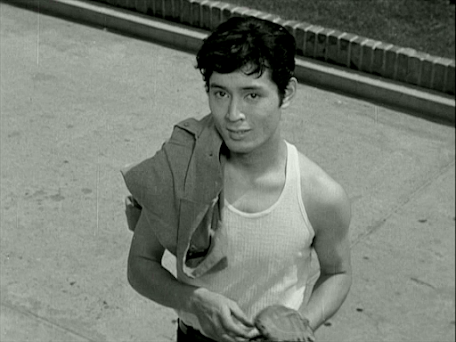Obscure Japanese Film #81
 |
| Yumeji Tsukioka and Tatsuya Nakadai |
This Nikkatsu production stars Yumeji Tsukioka as Emi, a half-Japanese, half-British actress who belongs to a Shingeki theatre company (i.e. one specialising in performing Japanese translations of dramas by playwrights such as Shakespeare and Chekhov). The film opens with Emi learning that her British father has passed away suddenly. Despite being shocked and saddened, she manages to pull herself together and deliver a good performance in the evening. After the show, she’s approached by two men, a producer (Toru Abe) and director (Nobuo Kaneko) who work in the film industry and want to give her a screen test, but first she must seek permission from Tajima (Shin Date), the director of the theatre company with whom she is having an affair. On her way home, she meets her ex, Sugiyama (Tatsuya Mihashi), who disapproves of her career and wants to get back together, but she brushes him off. They have a bitter argument, after which she is escorted home by Toku (Shiro Osaka), a lighting technician at the theatre who has a crush on her, although she regards him only as a friend. At home, she is visited by Tajima, who gives his approval for her screen test the following day.
 |
| Tsukioka with Shin Date |
At the studio, she encounters a young actor, Keiichi (Tatsuya Nakadai), and feels a strong attraction to him which seems to be mutual. Later, at a birthday party for one of the studio’s stars (real-life star Mie Kitahara), she dances with Keiichi. This is noticed by the producer and director, who decide they make a good couple and cast them together in a film entitled Phoenix. Emi and Keiichi soon find themselves a hot topic in the gossip columns, but when the studio holds the first test screening of Phoenix, Keiichi is mysteriously absent. It turns out that he has been arrested for his part in a demonstration against the presence of American military bases in Japan. As Emi becomes more involved with Keiichi, she begins skipping rehearsals at her theatre company and her relationship with Tajima becomes increasingly tense. To add to her troubles, she discovers that Keiichi has been two-timing her with a young actress, Kazuko (Sanae Nakahara), who belongs to the same student theatre group as himself.
I couldn’t help finding the content of this film rather inconsequential and I wasn’t sure how I was supposed to feel about Emi or why I should particularly care. She is certainly not an entirely sympathetic character – she shirks her responsibility to the theatre and treats her older sister (Hisano Yamaoka) like a servant. But of course, it could be argued that this makes her more believable and interesting than the straightforwardly ‘good’ heroines typical at the time.
 |
| A first edition copy of the original novel. |
The film was based on a bestseller of the same name first published in 1953 and written by Sei Ito, a writer popular at the time, so that’s one reason for the film’s existence. The other is to provide a vehicle for Yumeji Tsukioka, a talented actress most likely to be familiar to viewers in the West from her roles in Hiroshima (1953) and The Eternal Breasts (1955). Tsukioka was Nikkatsu’s top female star at the time. The following year, she married the director of this picture, Umetsugu Inoue, a prolific filmmaker seemingly able to turn a deft hand to almost any given genre. He was also known as Umeji, making the couple Umeji and Yumeji.
Today, Hi not tori is most likely to be of interest for providing Tatsuya Nakadai with his first substantial film role (it was Yumeji Tsukioka herself who suggested him for the part). Inoue gives him a fantastic entrance around 26 minutes in when Emi notices a casually confident Keiichi strolling past below her with his shirt off and looking up at her admiringly. In fact, it looks as if Nikkatsu’s intention was to introduce the 23-year-old Nakadai as a new sex symbol. However, in some of his later scenes, he’s a trifle awkward and his inexperience shows – perhaps that’s why it would be a few more films down the line before he made his true breakthrough with Black River (1957). Of course, Tsukioka and Nakadai are both playing characters rather like themselves, although it was actually Nakadai who had the Shingeki background.
Hi no tori provides an interesting behind-the-scenes glimpse of the real Nikkatsu studios, and it’s probably those with a particular affection for Japanese films of this vintage who will appreciate this one the most, not to mention enjoy the uncredited cameos by Mie Kitahara, Frankie Sakai, Masumi Okada, Hiroyuki Nagato, Izumi Ashikawa and Rentaro Mikuni.
NB. Nakadai later appeared in a 1978 film with the same title directed by Kon Ichikawa which has nothing whatever to do with this one.
Watched without subtitles.



No comments:
Post a Comment